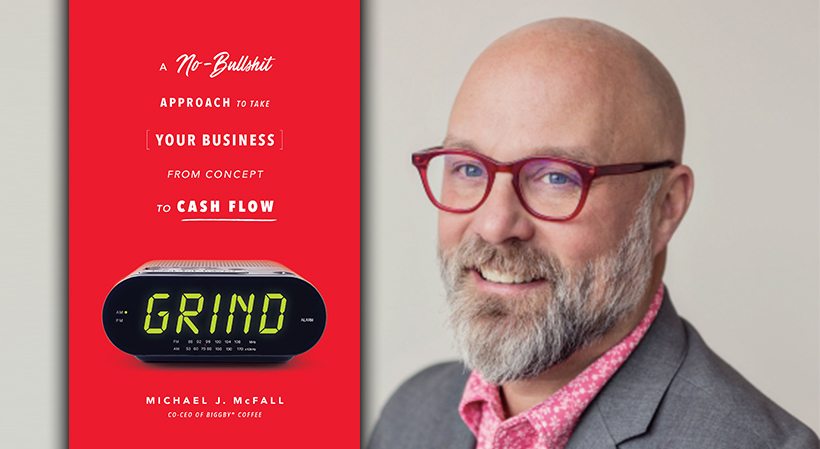This excerpt appears in “Grind: A No-Bullsh*t Approach to Take Your Business from Concept to Cash Flow,” written by BIGGBY COFFEE® co-CEO Mike McFall.
Be patient with the results but aggressive in execution!
If I have learned one thing in my career, it’s that nothing happens as quickly as I would like. Patience is one of the fundamental keys to success in any startup. It is the rare endeavor that ramps up quickly, and if your startup does, you should consider yourself lucky: you won the lottery. If it does, you can scoff at the premise of my book, and I will sincerely congratulate you for a job well done. Most of us, though, must be patient. Patience isn’t about being OK with time passing; patience isn’t about accepting any eventuality. Patience is making sure you are sticking to your knitting, knowing it is going to work in the end—doing the right things day in and day out, knowing the results will show up.
Over the years, I have seen countless people grow impatient and start cutting corners because the proven methods aren’t producing quickly. In the end, the shortcuts impede the performance of the business, and whatever momentum was building slows and eventually goes away. In my business, we advocate the same model to everyone. One of the saddest things I see is an operator who is losing faith and starts to cut corners when they were only a few feet, moments, customers away from it all working.
Impatience breeds disappointment. If you are disappointed in your business, you will be lacking one of the primary fundamentals: enthusiasm. Once you are headed down this dark path of disappointment, it is hard to turn back. It is a pretty exceptional person who can turn it around once they are in the swamp of disappointment.
Impatience stems from going into the business with unrealistic expectations. It is something I work on constantly in my business. If you think you should be cash flowing and managing the business from your back patio with cocktail in hand by month nine, you are headed for a train wreck of disappointment. It can happen, it has happened, but it isn’t going to happen to you. You are in for a long, slow struggle. Are you going to be patient? Are you going to nurture the business? Are you going to show up and execute daily, perfectly, and give the business the time it needs to mature and develop revenue?
Typically, impatience is bred by a lack of cash. The business isn’t generating enough sales. You are negative cash flowing, and therefore you decide to cut back on some things to save money to preserve your cash and fight another day. This is logical and almost a visceral reaction at the moment. The problem is, it doesn’t work. Once you start going down this path, it becomes a never-ending process of small cuts to save the business. Once this mentality has set in, it is the first step in the demise of the business. You have to stay patient and figure out how to get the money while executing perfectly and aggressively. Easy to say, difficult to do.
BIGGBY Coffee Co-Founder Shares His Company’s Journey to Conscious Capitalism
Some examples might be helpful. One of the first and easiest things to cut in any budget is advertising. Proving that an advertising campaign is working is nearly impossible. The dollars are usually pretty big and are easy to cut. But if you stop promoting your business and expect your revenue to grow, you are in a delusional state. The mistake is so obvious. Second is to start cutting labor, just a few well-timed hours here and there at the beginning, but three months later you are running with a skeleton crew. If you are committed to providing human interaction in your business at launch but the person answering the phone is expensive, you go with an automated system. In my business, you start to run with one barista on the floor in the evening. It makes sense; the evening is slow. A few months later it makes sense to cut it to one barista in the afternoon on certain days. But the result of all these labor cuts is that the customer experience suffers and you end up with fewer customers.
Probably my most extreme example of impatience and the need to save money to survive was an owner-operator who rationed whipped cream at a store. He allowed the store five bottles of whipped cream to start the day. When it was gone it was gone; nobody else would get whipped cream. The list goes on.
There is only one decision to be made—get more money, keep operating at the highest level and be patient, or shut down and lick your wounds. Getting more money is difficult, almost impossible, but so it goes. Figure it out or sail away on the ship of lost hopes and dreams.
Be humble, curious and ready to learn
Arrogance and ignorance are the ingredients in the worst-tasting bowl of slop ever produced. Arrogance is ignorance. Anyone who believes they have the answers is destined for the proverbial train wreck. By definition, if you have never opened a business before, you should consider yourself ignorant on the topic. Blend in arrogance, which is going to get in the way of you believing in your need to learn, and you have a recipe for disaster or a bowl of horrible-tasting slop.
The great proprietors, the ones I have watched and read about who grow startups into successful enterprises, are the ones who are confident in their ability—their ability to learn and adapt.
One of their biggest assets is that they know they have a ton to learn in their new enterprise. They know how much they don’t know about making it successful. They are committed to learning and growing both themselves and their business.
Being the owner of a franchise company, I get to see this dynamic unfold firsthand. The barrier to entry is fairly steep, and to make the necessary capital investment, you most likely were accomplished in some other area of life and/or business. Based on the successes of your previous life, you may feel cocksure and ready to execute. Naturally and logically, you are confident. But execute what? If you are investing in a franchise, are you ready to learn and execute the franchise model flawlessly? First, in our business you must understand that you don’t know much about building a successful coffee shop. Second, you must be willing to learn everything about the system and wake up every day ready to execute said system—every detail. If you execute every detail that you learn, my prediction is you will do well in the business. If you enter our world thinking you know “business,” if you are confident in your ability to manage and grow a business, and if all of our processes and systems seem a tedious burden, my prediction is you will struggle. How hard can it be to run a coffee shop anyway?
My advice, whenever I have the opportunity to give it to a new operator entering our world, is to take the first two years of operation and treat it like you are going back and getting a master’s degree in the retail gourmet coffee business. Therefore, a big part of your initial investment in the business is the educational component of the first two years. At the end of two years, much of what we recommend and advocate—the system—will make sense to you, I promise. At the end of two years, I am ready to sit down and get your feedback and try to improve what we are doing. At the end of two years, you are ready to go and start actually building your business on top of the foundation of what you have learned. The launching point of your business is not the day you open; it is 730 days into the business.
If you are starting a business from scratch, not entering a franchise, this process is longer. I think it is at least double. In our business it took five to seven years. We hadn’t figured out the model, and we didn’t understand the nuances of the business that would allow us to make any real money for a very long time. There was so much to learn, so much to get organized. It is a long, slow, difficult process.
Gut check: Are you prepared to commit years of your life to the educational process, learning the business in order to prepare yourself to increase the value of your asset after this initial period? Are you humble enough to admit you don’t know this business and you have a ton to learn? If so, I think you are in the right frame of mind to be successful in your new startup enterprise. However, if you scoff at the thought of this extended period of education and are thinking instead, I am going to get my original investment back in two years, I think you need to consider that arrogance is likely to get in the way of your success.






